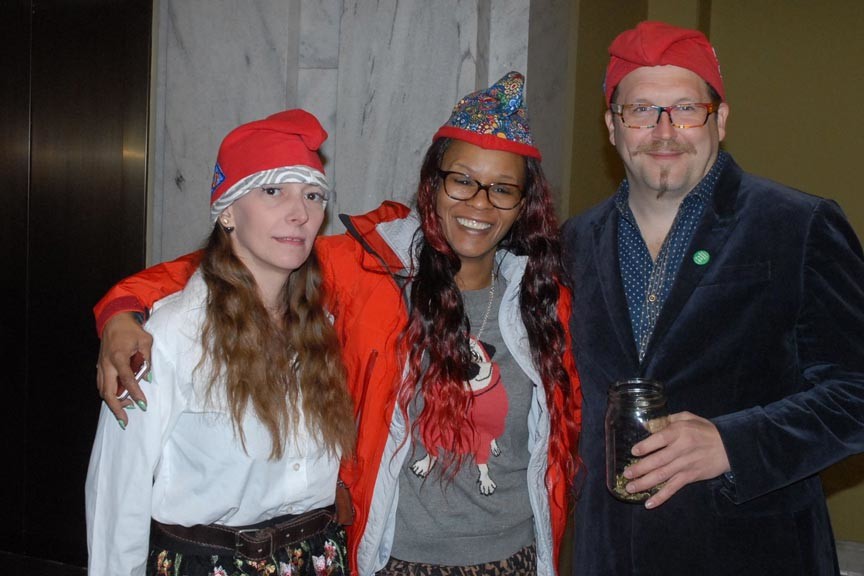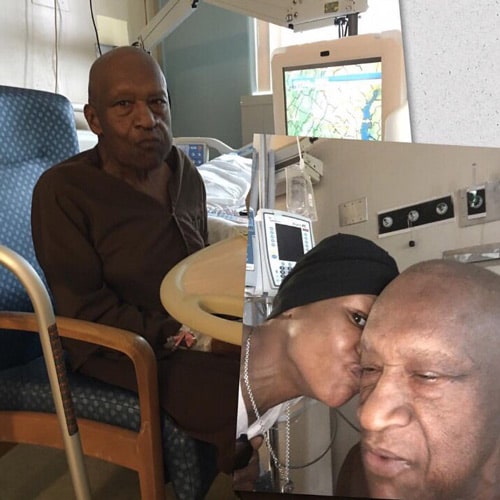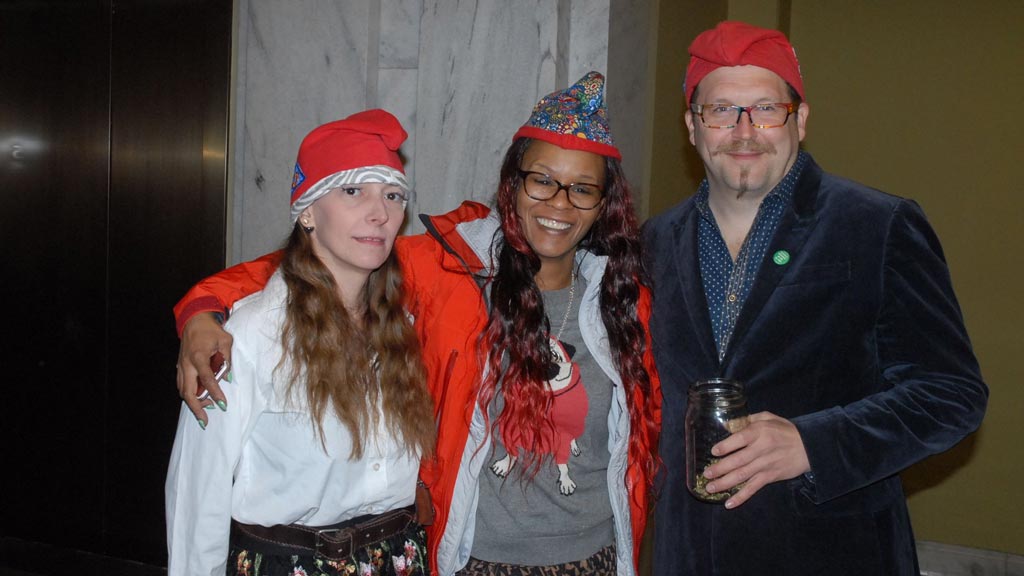How activists are fighting for full cannabis legalization in Washington, D.C.
When two men entered a party in Uneeda Nichols’ home in Washington, D.C. in August 2017 with a couple hundred dollars in cash, they were greeted as cannabis enthusiasts. No one realized they were undercover cops.

Psymposia is a 501(c)(3) nonprofit research and media organization that offers critical perspectives on drugs, politics, and culture. We rely on contributions from our readers and listeners. Your support is vital to sustaining Psymposia.
Support Psymposia’s independent journalism on Patreon and help us drive the Mystery Machine! We’re a bunch of meddling kids who are unmasking the latest shenanigans on the psychedelics beat.
When two men entered a party in Uneeda Nichols’ home in Washington, D.C. in August 2017 with a couple hundred dollars in cash, they were greeted as cannabis enthusiasts. They seemed eager to indulge in the bong rips, edibles, and other activities taking place.
Nichols had opened her home for some local cannabis vendors and brands to throw the event, where guests came to enjoy their products. These underground ‘pop-up’ cannabis events are common in the District. The two men made some purchases and then left.
No one realized they were undercover cops. Shortly after, D.C.’s Metropolitan Police raided Nichols’ home and arrested her and several others. After the police found over 40 plants in her home, Nichols was charged with several cannabis-related crimes. She maintains her innocence and says she owned the plants legally under D.C. law.
The most tragic consequence of the raid, however, was what happened to Nichols’ elderly uncle James McIlwain. The 84-year old Vietnam veteran lived in her house under her care, suffering from gout, prostate cancer, and heart problems. “The police raided my house where my uncle was in a hospital bed for six hours,” Nichols said. “The arrest and search was too much on his heart. He passed shortly after as a result.”

Nichols is one of many D.C. residents who have been persecuted in a police crackdown on underground cannabis parties and trades. Though the city legalized cannabis in November 2014, its efforts to regulate sales have been handcuffed by a one sentence amendment Congress inserted at the last minute in a federal spending bill in December 2014. The amendment is simply called the ‘Andy Harris rider’, after the Republican Representative of Maryland’s First District who authored it.
The rider’s language specified, “none of the funds contained in this Act may be used to enact any law, rule, or regulation to legalize or otherwise reduce penalties associated with the possession, use, or distribution of any schedule I substance”.
Cannabis legalization entered force in 2015 in the District, but the Harris rider has limited its scope. District residents can legally possess up to two ounces of cannabis, grow up to three mature plants in their home, and gift cannabis to others without exchanging money. It is this third provision on gifting which has created a legal gray area in the District, sparking an explosion in underground transactions.
Local cannabis activist RachelRamone Donlan of DCMJ explained how this ‘gray market’ works. “Cannabis brands or companies will trade things like art, stickers, or a pack of Skittles,” Donlan said. “Then they say ‘here’s a gift, I’m gonna give you some cannabis’. But Skittles don’t cost a couple hundred dollars. This is called remuneration and it’s not allowed under the law.” Much of the underground activity takes place at the ‘pop-up’ events, in bars, nightclubs, and private homes.
The situation has caused headaches for everyone in the city. Though police focused little on the ‘pop-ups’ for the first couple years, they have decided to step up their enforcement as the parties have grown larger and started attracting visitors from outside the city. “No matter what the government does, there’s gonna be more arrests because people won’t stop to get their cannabis,” Nichols said. “There’s so much money in this. So many people want this medicine. So we might as well tax it and get the money from it.”
Local activist Lisa Scott agrees. That’s why she formed the D.C. Cannabis Business Association (DCCBA). Before, she helped found the District’s pop-up movement back in 2015. “The pop-ups were great for a while but then the crackdown started happening,” she said. “Now we have to move on if we want to be legal. I started the DCCBA to prepare a lot of the local wannabe businesses for when the laws change. We want to be first in line to get the licenses and we don’t want outsiders to come in with big pockets and take what we started.”
Like many local cannabis enthusiasts, Scott pushes for a legal and regulated market—but fears that production and distribution will be controlled by a few wealthy investors that shut out smaller businesses. “We’ve already proven cannabis is a successful business model here, even though it’s illegal. We’ve brought in thousands of people every week—from Maryland, Virginia, other states, and around the world. We don’t want what we started to be taken away from us.”
Scott highlighted D.C. Mayor Muriel Bowser’s “A Fair Shot” program to help develop economic opportunities the city’s African American population. The cannabis market, Scott says, will fit perfectly with the mayor’s approach for helping the city’s residents start new businesses.
DCCBA, for their part, is busy developing the infrastructure for local cannabis businesses once full legalization comes. They are helping entrepreneurs understand licenses and regulations, build a reference of lawyers and legal professionals, and create networking opportunities. Not interested in large corporations controlling the market, Scott favors small, micro-businesses, owned by families and local residents, working together in co-operatives.
Though the city government cannot advance any legalization efforts absent a change in the federal funding prohibition, they have begun to prepare legislation. In January 2017 City Council members David Grosso, Robert White, and Brianne Nadeau proposed a bill to legalize and regulate sales. Scott welcomes this progress, but wants to work with the council to improve the future law. “We want the requirements for licensing to favor local residents,” she said. “We want a fair shot.”
Besides lobbying lawmakers, cannabis activists in the District are making sure their efforts remain in the spotlight through public rallies and actions. On Tuesday March 27th, 2018, activists from DCMJ and the DCCBA took part in a ‘pot giveaway’ outside the John A. Wilson Building housing the city council and mayor’s office. They handed out rolled cannabis joints to anyone over the age of 21—including City Council members Grosso and Jack Evans. (Most other council members took a separate exit to avoid seeing the demonstration, Scott told me.)
“That was good for me,” Nichols said, “just seeing that they accepted us and there were no police trying to put us out. If we continue to do this and they know what we stand for, we’ll make our presence known.”

Activists are also pushing to make cannabis accessible to the District’s most vulnerable residents. “We’re looking forward to our ‘Bring it Home; campaign,” Nichols said. “The day after we were at the Wilson building we were at the Housing and Urban Development building. We want to let people in public housing grow in their homes, just like they can grow fruits and vegetables.” Currently, about 20,000 residents of federal public housing in the District are prohibited from growing or possessing cannabis, risking eviction and homelessness if they do. DCMJ wants this campaign to unite activists around the country in support of all public housing residents.
Even with all this activity, D.C.’s cannabis activists are not limiting their efforts within the boundaries of the federal district. DCMJ co-founder Adam Eidinger has relocated to Salisbury, Maryland, nearly a hundred miles away. His goal is to help unseat Representative Andy Harris, the namesake of the Harris rider. He and a group of D.C. activists are supporting Allison Galbraith, a single mother running a grassroots campaign for the Democratic nomination in Maryland’s First District.
Galbraith supports legalizing cannabis on the federal level to allow all adults the right to use it. “The arrests would stop if the federal law would change and we just made it outright legal,” she said. “I want to get to the root of the issue, which is that it’s classified incorrectly.”
But absent a successful federal reform of cannabis law, Galbraith supports repealing the Harris rider and respecting the District’s autonomy. “I trust in D.C.’s ability to make laws for itself. The rider shouldn’t be there. Congress should be recognizing and upholding its rights.”
Galbraith considers the Harris rider an overreach of federal authority. “He’s not doing his job,” she said. “His job is to listen and be available and be responsible and advocate on behalf of the people he represents.”
Galbraith describes herself as pro-‘state’s rights’ as long as state laws honor basic rights and protections for their people. “As far as states go about implementing policies, local is better,” she said. “Let them decide how to meet their goals. That’s how we drive innovation, by having pilot programs and letting them try different things.”
Though she faces a tough competition both in the Democratic primary and general elections, Galbraith can count on the assistance of her allies from D.C. “Our activists are in Salisbury now doing outreach and getting people registered to vote,” Nichols said. “We plan on staying out there continuously through the election. That’s how we will support Allison.”
Hey! Before you go… Psymposia is a 501(c)(3) non-profit media organization that offers critical perspectives on drugs, politics, and culture. We strive to ask challenging questions, and we’re committed to independent reporting, critical analysis, and holding those who wield power accountable.
Our perspectives are informed by critical analysis of the systemic crises of capitalism that have directly contributed to the unmitigated growth of addiction, depression, suicide, and the unraveling of our social relations. The same economic elite and powerful corporate interests who have profited from causing these problems are now proposing “solutions”—solutions which both line their pockets and mask the necessity of structural change.
In order for us to keep unpacking these issues and informing our audience, we need your continuing support. You can sustain Psymposia by becoming a supporter for as little as $2 a month.





